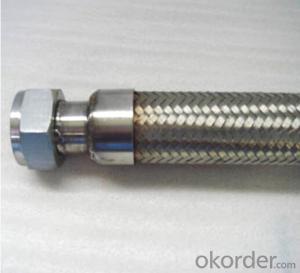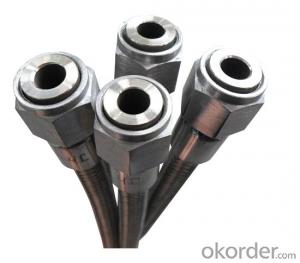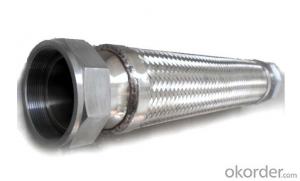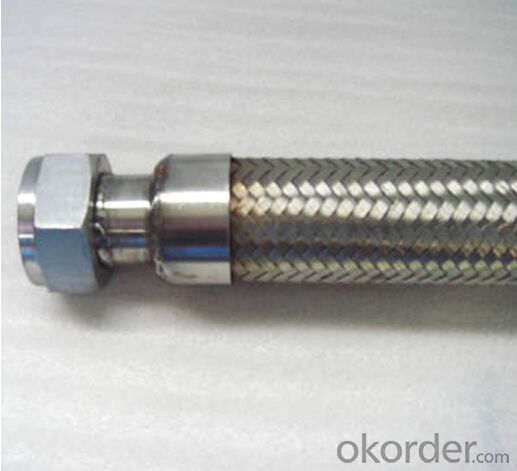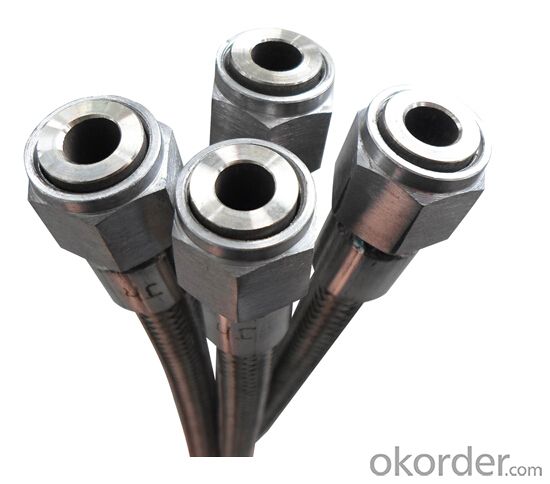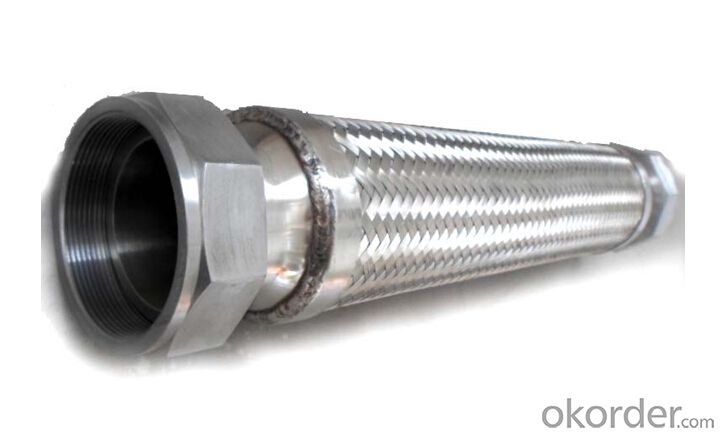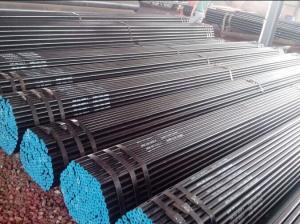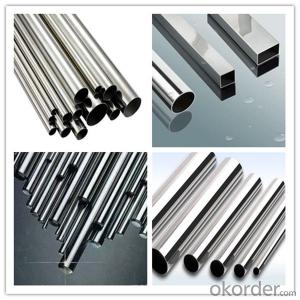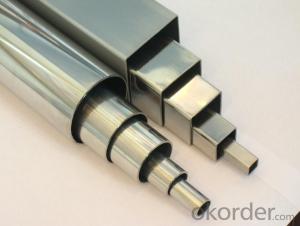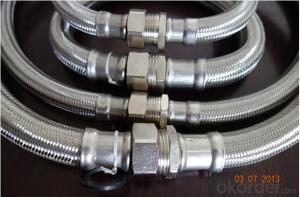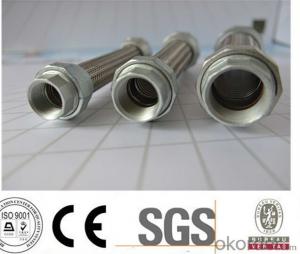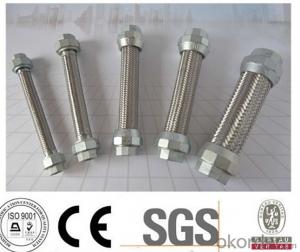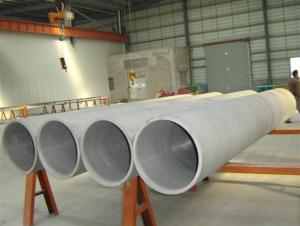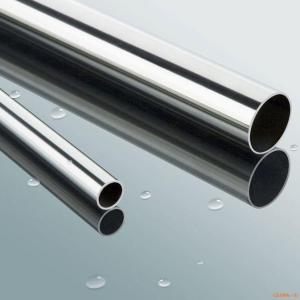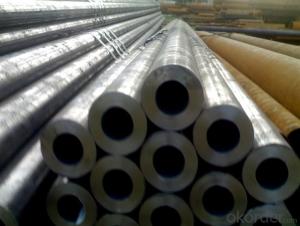Stainless Steel Braid Hose for Construction
- Loading Port:
- Tianjin
- Payment Terms:
- TT OR LC
- Min Order Qty:
- 1000 pc
- Supply Capability:
- 100000 pc/month
OKorder Service Pledge
OKorder Financial Service
You Might Also Like
Specification
Stainless Steel Braid Hose for Construction
Applications of Stainless Steel Braid Hose for Construction:
--Refueling system
--Chemical and pharmaceutical industry
--Industrial hydraulic systems
--Air conditioners in industrial and construction –site vehicles
--Food and beverage industry
--Special and standard industrial applications
--Water and cleaning management
Features of Stainless Steel Braid Hose for Construction:
1. )O. D.: 13-18MM 0.2-3M long
2. )Nut.: Nickel/Chrome Plated Brass (Zinc / Iron / Aluminum is available)
3. )Size Of Nut.: Female&Male 1/2''; 3/4''; 3/8''; 7/8''; 5/16'', and M10...
4. )Insert.: Brass (Zinc / Aluminum / Plastic is available)
5. )Inner tube.: Rubber/ EPDM/PVC
6. )Covered Material: Stainless Steel 201, 301, 304 /Aluminium Wire
7. )Working Pressure: 5Kg-15Kg
8. )Temperature: 0-92° C
9. )Quality Assurance: 3 years
RemarkAPPLICATION: HOUSEEHOLD WARE, BATHROOM WARE, SHOWER HOSE
PAYMENT: T/T, L/C
DELIVERY TIME: 20DAYS OR 30DAYS AFTER RECEIVED 30% DEPOSITS
MOQ: 5000PCS
ODM&OEM IS ACCEPTABLE
PackageInner: PP bag /Blister packing Outer: Carton box
Specifications of Stainless Steel Braid Hose for Construction:
NO | I.D | Refer to O.D | Working pressure | Burst pressure | approximate Weight | |||||
(inch) | (mm) | (inch) | (mm) | MPa | Psi | MPa | Psi | kg/m | lbs/ft | |
1 | 1/8 | 3.2±0.2 | 0.35 | 9±0.3 | 2.06 | 300 | 8.27 | 1200 | 0.078 | 0.12 |
2 | 5/32 | 4±0.2 | 0.4 | 10±0.3 | 2.06 | 300 | 8.27 | 1200 | 0.092 | 0.14 |
3 | 3/16 | 4.8±0.2 | 0.43 | 11±0.3 | 2.06 | 300 | 8.27 | 1200 | 0.108 | 0.16 |
4 | 1/4 | 6.3±0.3 | 0.5 | 12.7±0.3 | 2.06 | 300 | 8.27 | 1200 | 0.134 | 0.2 |
5 | 5/16 | 8.0±0.3 | 0.56 | 14±0.3 | 2.06 | 300 | 8.27 | 1200 | 0.147 | 0.22 |
6 | 3/8 | 9.5±0.3 | 0.63 | 16±0.4 | 2.06 | 300 | 8.27 | 1200 | 0.182 | 0.27 |
7 | 15/32 | 12±0.3 | 0.75 | 19±0.5 | 2.06 | 300 | 8.27 | 1200 | 0.238 | 0.35 |
8 | 1/2 | 12.7±0.4 | 0.78 | 20±0.5 | 2.06 | 300 | 8.27 | 1200 | 0.262 | 0.39 |
9 | 5/8 | 16±0.4 | 0.94 | 24±0.5 | 1.03 | 150 | 4.12 | 600 | 0.351 | 0.52 |
10 | 3/4 | 19±0.4 | 1.13 | 28.8±0.5 | 1.03 | 150 | 4.12 | 600 | 0.515 | 0.77 |
11 | 1 | 25.4±0.5 | 1.38 | 35±0.6 | 1.03 | 150 | 4.12 | 600 | 0.637 | 0.95 |
Images of Stainless Steel Braid Hose for Construction:
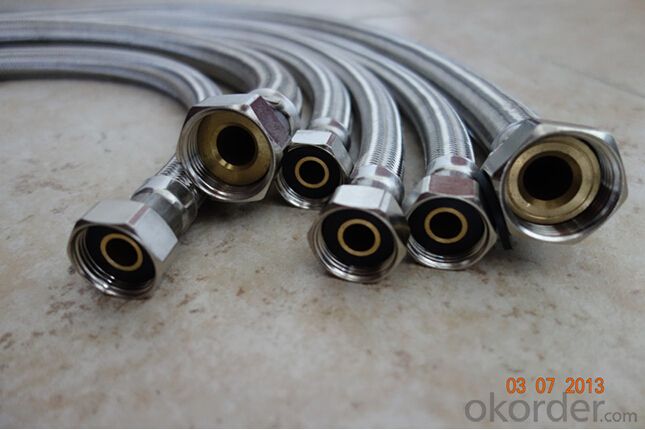
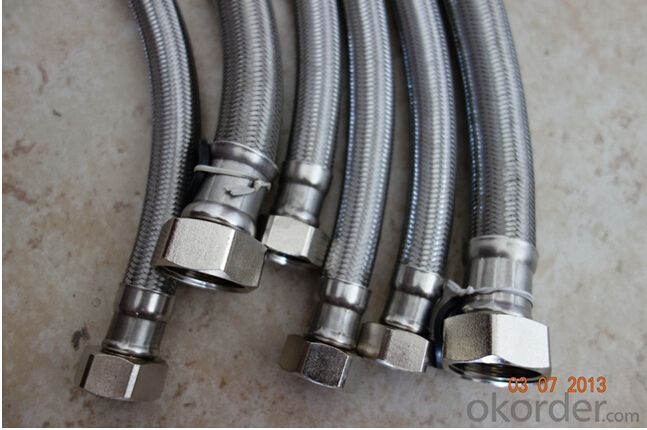
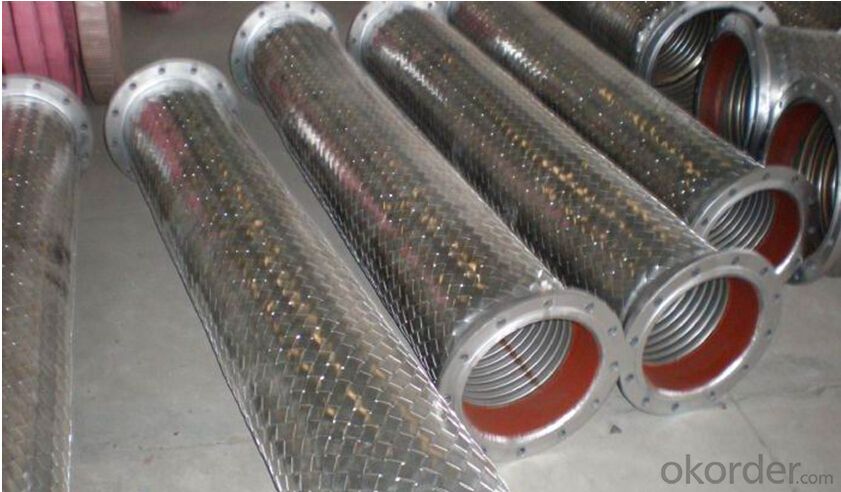
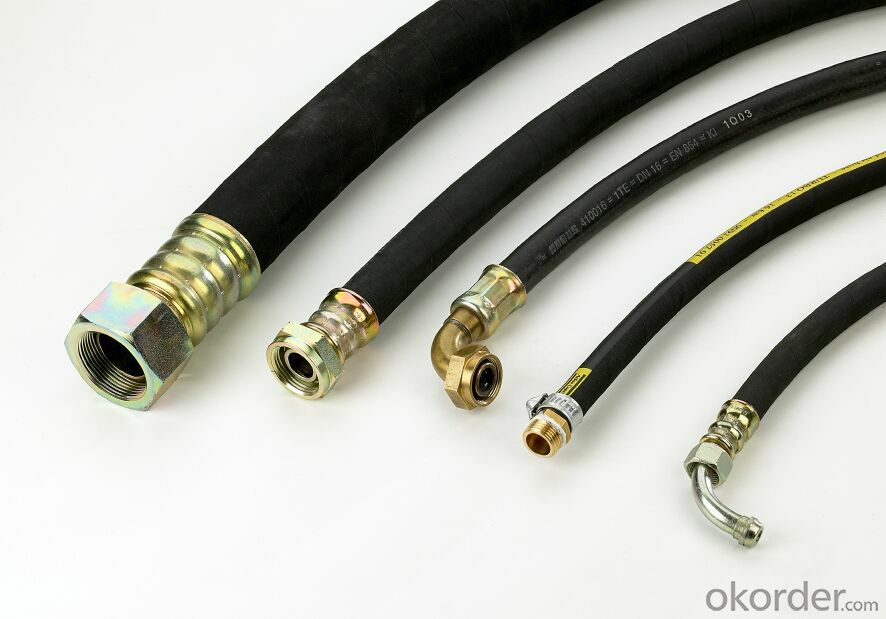
Package of Stainless Steel Braid Hose for Construction:
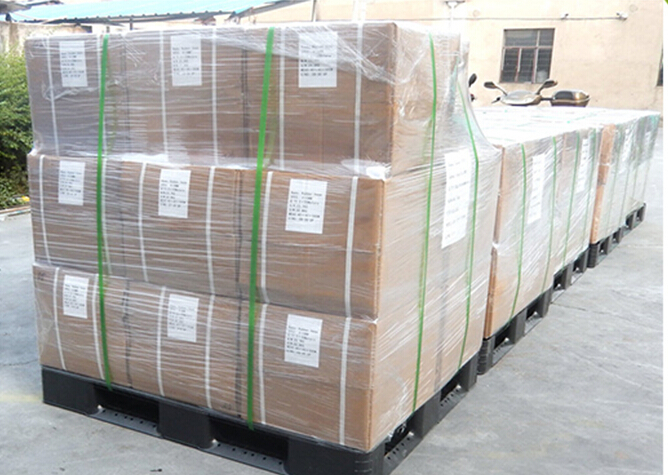
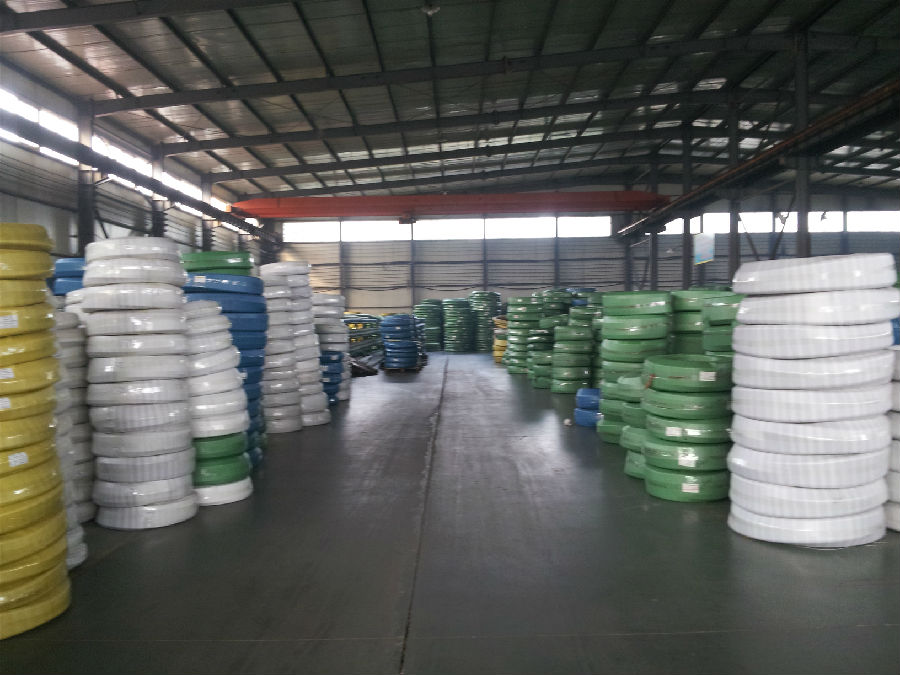
FAQ of Stainless Steel Braid Hose for Construction:
Who we are:
Answer: We CNBM is a Chinese state-owned enterprise ranked 267th among the Global Fortune 500, as the largest building materials company,we have over 300 affiliated companies,and so many production lines and branch office distribute in China.
2. About our quality:
Answer: Every product needs to be quality proved before shipping.
3. About our service:
Answer: We could gurantte that we can reply you in 2 working hours.
- Q: Can stainless steel pipes be used for underground drainage?
- Yes, stainless steel pipes can be used for underground drainage. Stainless steel is a highly durable and corrosion-resistant material, making it suitable for various applications, including underground drainage systems. It offers excellent resistance to rust, corrosion, and chemical damage, ensuring a long lifespan and minimal maintenance requirements. Additionally, stainless steel pipes have high strength and can withstand high-pressure conditions, making them ideal for underground drainage where they may encounter external load or stress. Furthermore, stainless steel pipes are known for their smooth inner surface, which helps to prevent clogs and facilitate the efficient flow of water and waste. Overall, stainless steel pipes are a reliable and long-lasting choice for underground drainage systems.
- Q: What is the difference between annealed and pickled stainless steel pipes?
- Annealed stainless steel pipes and pickled stainless steel pipes both undergo different processes that affect their properties and appearance. Annealing is a heat treatment process that involves heating the stainless steel pipes to a specific temperature and then slowly cooling them. This process helps to relieve internal stresses and improve the ductility and toughness of the material. Annealed stainless steel pipes are usually softer and more malleable, making them easier to work with during fabrication and installation. They also tend to have a smoother, more polished surface finish. On the other hand, pickling is a chemical process that removes surface impurities such as oxides, scales, and rust from stainless steel pipes. It involves immersing the pipes in an acid solution, typically a mixture of nitric and hydrofluoric acid, which dissolves the impurities. Pickling helps to restore the corrosion resistance of the stainless steel and leaves a clean, bright, and uniform surface finish. In summary, the main difference between annealed and pickled stainless steel pipes lies in the processes they undergo. Annealing improves the material's ductility and toughness, while pickling removes surface impurities and restores corrosion resistance. The choice between annealed and pickled stainless steel pipes depends on the specific requirements of the application, such as the desired mechanical properties and surface finish.
- Q: What are the advantages of stainless steel pipes?
- There are several advantages of using stainless steel pipes. Firstly, stainless steel pipes are known for their excellent corrosion resistance. They are resistant to rust, oxidation, and other types of corrosion, making them highly durable and long-lasting. This resistance to corrosion also makes stainless steel pipes suitable for various industries, including marine, chemical, and food processing. Secondly, stainless steel pipes have high strength and heat resistance. They can withstand high pressure, making them suitable for applications that require transporting fluids or gases at high temperatures and pressures. Stainless steel pipes also have superior heat resistance, making them suitable for applications involving extreme temperatures. Additionally, stainless steel pipes are hygienic and easy to clean. The smooth surface of stainless steel pipes makes it difficult for bacteria to adhere to the surface, making them ideal for sanitary applications such as food processing, pharmaceuticals, and medical devices. Stainless steel pipes are also easy to clean and maintain, reducing the risk of contamination. Furthermore, stainless steel pipes have excellent aesthetic appeal. They have a sleek and modern appearance, making them suitable for architectural and decorative applications. Stainless steel pipes are often used in construction, interior design, and automotive industry for their attractive and polished finish. Lastly, stainless steel pipes are environmentally friendly. They are 100% recyclable and can be reused without losing their properties. This makes stainless steel pipes a sustainable choice and contributes to the reduction of waste and environmental impact. In conclusion, the advantages of stainless steel pipes include corrosion resistance, high strength and heat resistance, hygienic properties, aesthetic appeal, and environmental friendliness. These qualities make stainless steel pipes a versatile and reliable choice for a wide range of applications.
- Q: How do you protect stainless steel pipes from external damage?
- To ensure the protection of stainless steel pipes from external damage, there are several steps that can be taken: 1. Applying a protective coating: To shield the stainless steel pipes from moisture, chemicals, and physical harm, consider utilizing a protective coating such as paint or epoxy. Select the coating based on the specific environment and potential risks in order to maximize protection. 2. Installation of pipe supports: Preventing excessive movement and vibration is crucial in avoiding damage over time. Properly install pipe supports using brackets, clamps, or hangers to securely hold the pipes in place and minimize the risk of external impacts causing harm. 3. Implementation of corrosion prevention measures: Although stainless steel pipes are resistant to corrosion, certain environments can still pose a threat. Regularly inspect the pipes for signs of corrosion and address any issues promptly. Utilize corrosion inhibitors or cathodic protection techniques to further safeguard the pipes from external damage. 4. Usage of protective guards or covers: In areas where the pipes are vulnerable to potential impacts or physical harm, the installation of protective guards or covers can provide an additional layer of defense. These guards can be made from materials like plastic or rubber and can be easily installed or removed as needed. 5. Implementation of proper handling and storage procedures: During transportation or storage, it is crucial to handle stainless steel pipes with care. Avoid dropping or dragging them and make sure they are stored in a clean, dry, and well-ventilated area to prevent moisture buildup and potential damage. By adhering to these measures, the lifespan of stainless steel pipes can be significantly prolonged, ensuring their functionality and protection against external damage.
- Q: Can stainless steel pipes be used in the agriculture industry?
- Yes, stainless steel pipes can be used in the agriculture industry. Stainless steel pipes are highly resistant to corrosion, making them ideal for agricultural applications where exposure to moisture, chemicals, and other corrosive substances is common. They are commonly used for irrigation systems, water supply lines, and various agricultural processes that require durable and long-lasting piping solutions. Additionally, stainless steel pipes are hygienic, easy to clean, and can withstand high temperatures, making them suitable for agricultural processes that involve food production and processing.
- Q: Are stainless steel pipes suitable for underground irrigation systems?
- Yes, stainless steel pipes are suitable for underground irrigation systems. Stainless steel is highly resistant to corrosion, making it an excellent choice for installations that are exposed to moisture, soil, and other elements found underground. It provides durability and longevity, ensuring that the irrigation system remains functional and reliable for an extended period. Additionally, stainless steel pipes have high tensile strength, making them capable of withstanding the pressure and stress that can occur in underground installations. Overall, stainless steel pipes are a reliable and suitable option for underground irrigation systems.
- Q: What is the maximum pressure rating for stainless steel pipe fittings?
- The maximum pressure rating for stainless steel pipe fittings varies depending on factors such as the size, type, and wall thickness of the fittings. It is important to refer to the manufacturer's specifications for accurate and specific pressure ratings for each stainless steel pipe fitting.
- Q: Can stainless steel pipes be threaded with NPT threads?
- Yes, stainless steel pipes can be threaded with NPT (National Pipe Thread) threads.
- Q: Are stainless steel pipes resistant to UV radiation?
- Yes, stainless steel pipes are generally resistant to UV radiation. The high chromium content in stainless steel helps protect it from the damaging effects of UV radiation, making it a suitable choice for outdoor applications.
- Q: Are stainless steel pipes suitable for oil refinery applications?
- Yes, stainless steel pipes are suitable for oil refinery applications. Stainless steel is highly resistant to corrosion, making it an ideal choice for transporting and processing oil and other petroleum products. The corrosion-resistant properties of stainless steel prevent the pipes from deteriorating due to exposure to corrosive materials and chemicals commonly found in oil refineries. Additionally, stainless steel pipes can withstand high temperatures and pressure, ensuring the safety and efficiency of oil refinery operations. Moreover, stainless steel is known for its durability and longevity, reducing the need for frequent maintenance and replacement. Overall, the use of stainless steel pipes in oil refinery applications provides a reliable and cost-effective solution.
Send your message to us
Stainless Steel Braid Hose for Construction
- Loading Port:
- Tianjin
- Payment Terms:
- TT OR LC
- Min Order Qty:
- 1000 pc
- Supply Capability:
- 100000 pc/month
OKorder Service Pledge
OKorder Financial Service
Similar products
Hot products
Hot Searches
Related keywords
